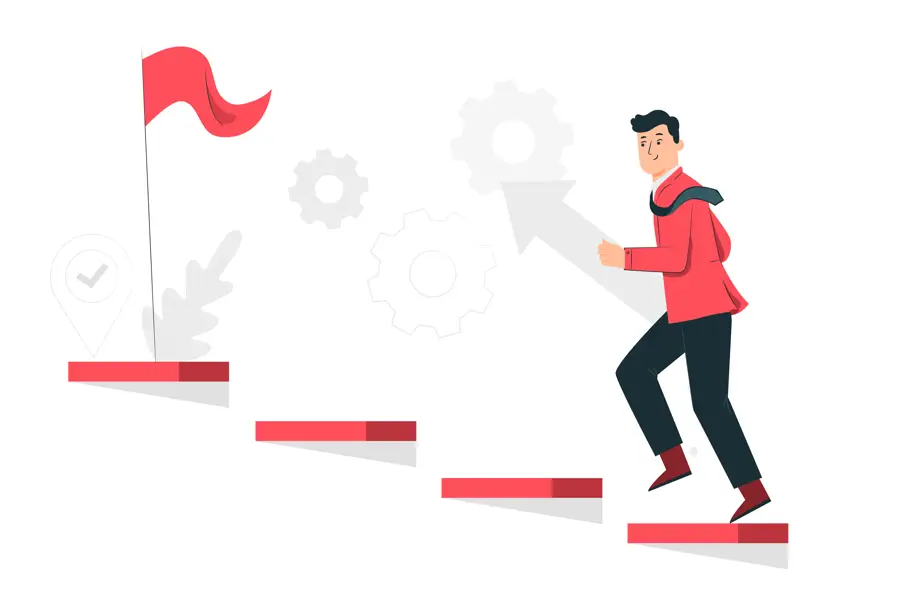Guide to Staying Competitive in the Job Market
When it comes to standing out in a competitive job market, the most important aspect, the one you should understand first, isn't the methods, it's the "way" because if you're heading in the wrong direction, no matter how good your methods are, you might end up even further from your goal, right? So, first, understand the competitiveness model to help you find the right direction.
Competitiveness Model

Level One: Physical Labor
The least competitive jobs are at the bottom of the pyramid, which includes physical labor.
Physical labor jobs are easy to understand, these are jobs that anyone can do, and they often lack value. These jobs are the most easily replaceable, which is why many people in these roles are vulnerable to layoffs.
Level Two: Knowledge
Above physical labor, you have knowledge work.
This level is fundamentally different from physical labor. Many fresh graduates remain at this level. During interviews, they can present numerous certificates and internships, but they often struggle to show what results they achieved or what problems they solved.
At this level, you can start solving many problems. If you understand that there is such a thing as passive income, you won't take studying lightly, and you won't believe in the "studying is useless" theory, which would lead you further away from your goals. Believe in the power of science and knowledge.
Level Three: Skills

At this stage, your competitiveness in the job market will undergo a significant transformation. Skills become valuable. For example, many people say, "I like using social products, and I'm really good at it." But this won't make a significant difference. At best, you'll get questions like, "Should I use this or that app to set up a meeting?"
However, when you reach the skill level, things should change. You should be able to do a lot more than that. For example, you could analyze the users and product characteristics of each social app and discuss their cost-effectiveness. Over time, your skills can significantly boost your competitiveness.
For instance, if you're excellent at using social products and have a following on various platforms, you go to a job interview at Netflix and present the analysis and reviews you've done for each social app you've used. Your competitiveness will surely exceed that of other interviewees in the same group.
The reason is simple: because you can immediately solve the company's problems, make the company money, while other fresh graduates will require some training. This is an excellent interview strategy but requires prior accumulation.
So, the first key point I want to make here is that, whether you're preparing for postgraduate studies, going abroad, job hunting, or already in the workplace, showcase your problem-solving skills! Don't become a mere cog in the business, being familiar with the work but incapable of solving unfamiliar problems. This situation makes you vulnerable to replacement.
What Skills Are Needed?
Now, when it comes to skills, there's a question: What skills are needed?
General Skills
The first type of skill is general skills, such as
-
Foreign Languages
-
Presentation Skills
-
Communication Skills,
-
Proficient in Microsoft Word, Microsoft Powerpoint, Microsoft Excel, Photoshop.
-
Emotional Management, Time Management, And Goal Management
Professional Skills
The second type of skill is professional skills, including
-
Programming
-
Recruitment
-
Marketing
-
Finance
Unfortunately, many people enter the workforce only to realize that the job they initially chose doesn't suit them, so they change positions after a year or two, fearing they've chosen the wrong career path. College provides numerous opportunities for self-discovery and skill development. There are plenty of opportunities to understand yourself and develop your skills. Many occasions allow you to showcase your abilities.
Life Skills
The third type is life skills, with financial management being the most important. For example, Singapore’s real estate prices make it tough for many people who've worked hard for decades to compete with their neighbor who simply bought a house. In addition, skills such as parenting, cooking, fitness, and yoga are also essential.
Therefore, I sincerely advise whether you're still in college or already in the workforce to cultivate a skill you enjoy. Become an expert in that field.
If you're interested in numbers, you can learn to use Excel. Being proficient at creating spreadsheets is valuable. Moreover, living in this era that encourages personalization, your interests can make your life richer. Many abilities can be transformed into passive income if you change your mindset.
For instance, if you have strong English skills, you can teach online English courses. If you're good at writing, you can earn money by publishing articles.
Resources

Skills lead to the next level: resources.
Here, let me explain an interesting phenomenon. Some wealthy individuals don't work hard and might not know much, yet they are valuable and can immediately take on high-level positions. The reason is simple: they have access to abundant resources that most people lack. If you're resourceful, you can achieve a lot more. So, instead of resenting the wealthy, strive to become one of them (note: wealth is not limited to material possessions).
From my practical experience, resources come in two forms.
Integrate Information Resources
The first is the ability to integrate information resources. There's a wealth of information online, and your ability to quickly gather the information you need from various sources and turn it into a skill or ability is valuable.
This skill is essential in daily life and work because you can't possibly be an expert at everything. When you encounter a problem in your job or daily life, you need to resolve it as quickly as possible.
For example, I currently need to create presentations, typesetting, and color matching. All of these skills are things I've learned in my free time through online resources, books, online courses, and seeking advice from others.
Discover and Integrate Resources
The second is your ability to discover and integrate resources. In simpler terms, it means you can create something out of nothing when you're given nothing. At the skill level, you become a professional, an expert, a specialist. At the resource level, you're a leader. You need not only manage your existing resources but also find resources from elsewhere to drive your work.
For example, my former roommate, Jane, is an architectural designer. She helps various companies improve their PowerPoint presentations. She also posted her PowerPoint templates on relevant websites for people to download for a fee.
This is when she started generating passive income (resource level). This created a good self-growing system. This is what many bosses do (system level).
Level Five: System

The final and highest level is to build a system.
For example, my previous job was in business development. I understood the importance of resources, so I looked for resources everywhere. I networked extensively, researched people's social media profiles, and got to know a lot of people.
I even found the personal Instagram account of the CEO of a smart home company,where I engaged by writing classical poetry, resulting in a valuable resource connection. I've continued to employ this resource integration approach in my current role, receiving trust from my superiors for tasks like applicant filtering, employee training, and project management, with a focus on regular updates.
As fortunate as I am, my ability to integrate resources is astonishing. So, my superiors often entrust me with tasks like filtering and interviewing job applicants, training new employees, and managing certain projects. All I need to do is provide regular updates, and that's it. I've also learned a lot about management from this experience.
Building a system is difficult, and I haven't reached that level yet. In simple terms, you become the boss, creating a well-structured, self-growing organizational framework for your company. That's why many bosses have time to travel or play golf. On the other hand, some bosses don't have the time because they're too involved in the nitty-gritty of the work and don't think systematically.
The Role of the Competitiveness Model

1. A comprehensive understanding of this model can help you grasp the steps and direction you need to improve your competitiveness in a competitive job market, ensuring you don't take the wrong path and that you don't stay stuck at a particular level. Many people remain at the knowledge or skill level.
2. Knowing your goals, having a clear destination, pushing yourself out of your comfort zone, avoiding repetitive inefficiency, and pushing through to the next level will make your life more exciting.
3. As you move up the levels, your transferability increases. How do you understand this? Skills are highly replaceable. Just as phones have largely replaced landlines, electric cars will likely replace gasoline vehicles in the future.
If you're unlucky, and your skill set is based on landlines, and the world no longer needs that technology, what will you do? You'll need to undergo a technical transformation, and at that time, you can't compete with the fresh, specialized talent. However, if you're at the resource level or above, you can quickly mobilize a group of people who know the new technology and start anew or pivot. That's why many high-level executives can switch industries and manage effectively.
Therefore, the awareness of passive income should be deeply ingrained from today onwards.
Jobs below the skill level are like manual labor, while jobs above the skill level are opportunities for passive income. However, the prerequisite is to progress step by step, finding a direction, learning a lot of knowledge, turning it into skills, and then using those skills to find resources. Finally, it becomes an automatic and self-initiated system.
Finally, I'll use a complete diagram and example to help you better understand this concept.
In Summary
Jane worked hard to lay the foundation (physical labor level), earned money, bought professional books, and read many books on powerpoint, layout, color matching, and design (knowledge level). After learning, she put what she learned into practice, repeatedly, turning it into problem-solving work skills (skill level).
With these skills, she found a good job to support herself (skill level). Then her boss recommended she help various companies with their PowerPoint presentations. She also posted PowerPoint templates for people to download for a fee (resource level).
But her boss is the most remarkable because he has his technical team, conducts research and development in different professional areas, and has multiple channels for promoting resources. This created a well-structured self-growing system. Many bosses do the same (system level).
Aniday's HR Services
Headhunting Service
Find and recruit quality candidates in just 1 week! Supported by 40,000 experienced headhunters in IT, Finance, Marketing… capable of recruiting in any region.
Headhunting Service ➔Employer of Record (EOR) Service
On behalf of your business, we recruit employees and handle payroll without the need to establish a company in markets such as Vietnam, Singapore, Malaysia, India, Indonesia…
Employer of Record (EOR) Service ➔